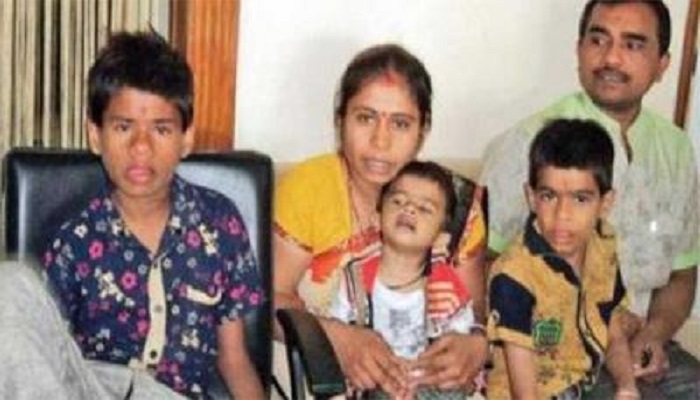
Haresh Chavda, a Botad-based mason, and his wife Kanchan are heartbroken as all their three children are born suffering with a rare mental disorder.
The kids are unable to speak or even gesture for food and water. The children are completely dependent on the couple for daily ablutions and have no control over defecation and urination. They also get seizures regularly.
After five years of advanced genetic testing, doctors found that the children have a rare anomaly called ‘Mental Retardation 42’. Dr Jayesh Sheth and Dr Frenny Sheth, both geneticists, say this is the first such detection in India and only ten children of six families have been detected with this genetic defect across the world. The disorder takes place when a copy of the defective PGAP1 gene is passed on to children from both parents.
Dr Jayesh said that the couple first came to them over five years ago. At the time, both of the daughters of the couple — Mittal (12) and Prarthana (10) — had mental retardation. The girls were born after two miscarriages. “We carried out a chromosomal study but the test did not reveal any anomaly,” said Dr Frenny. “Intrigued, we ordered the Array-Based Comparative Genomic Hybridization (ACGH) which is akin to an MRI of the genetic material. This revealed a deletion in LINGO2 gene which they inherited from the father. However, this defect is not potent enough to cause mental retardation. The mystery only deepened.”
The couple conceived again. Detailed tests of the foetus revealed that it had the deletion of LINGO2 gene as well as chromosome 13-14 translocation. “Usually, one copy of chromosome 14 is passed from the mother and another from the father,” Dr Jayesh said.
“If both copies are passed from the father it leads to the Kagamy syndrome. Since the foetus had multiple abnormalities, the couple had the foetus aborted.”
Later, the couple, desperate for another child, conceived yet again. This time, they took the help of the ‘Bhabhuti wale Babaji‘ who assured them that they would be blessed with a normal child. While doctors urged them to come for testing, the couple insisted that they did not want medical intervention. To the misfortune of the couple, their son did not grow normally, recognize his parents, hold his head steady, or even smile. “We were alarmed when Bhavik (2.5) suffered seizures like his sisters. With no doctor offering a diagnosis, we came back to the genetic centre,” Haresh Chavda said.
Doctors said that advanced exome sequencing, a detailed analysis of the genome, was carried out with a grant given by the Gujarat State Biotechnology Mission (GSBTM). “This finally revealed that the children had a defect in the PGAP1 gene which was passed from both the father and the mother,” said Dr Frenny.

Post Your Comments